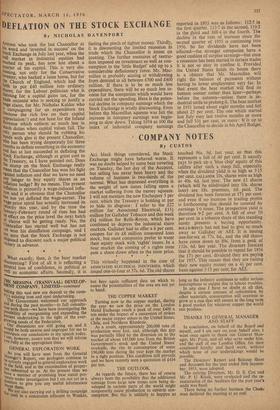DEFLATION ON THE STOCK EXCHANGE
By NICHOLAS
DAVENPORT
his who took the last Chancellor at ais word and 'invested in success' on the Stock Exchange in July last year, when the 'Pal market in industrial equities had 'cached its peak, has now lost about a (Waller of his capital. This is very dis- tressing, not only for the Conservative alvestor, who backed a lame horse, but for fa't
Church of England, which had the
h to put £40 million into ordinary shares, for the Labour politician who is thirsting for a capital gains tax, for the trade unionist who is seeking to justify a wage claim, for Mr. Nicholas Kaldor who 13, Campaigning for an expenditure tax , aecause the rich live on their capital a,Ppreciation!) and not least for the Inland ttevenue which collects so much less in (leash duties when capital values fall. The hands person who should be rubbing his 'lands with glee is the present Chancellor, _Who has been trying desperately for three months to deflate something in the economy and has at last succeeded in deflating the Stock Exchange, although at great cost to ;fie Treasury, as I have pointed out. Does the slump on the Stock Exchange really Mean that the Chancellor has won his fight against inflation and that we have no need ,y longer to buy equity shares as an aulation hedge? By no means. The present lqation is primarily a wage-induced infla- an and it is obvious that the Chancellor as not yet deflated the Wage-earner. The , 11,8e-price spiral has actually increased its 'city this year, and by the time the January-February round of rises has had its effect on the price level the next batch (.°1-, Claims will be getting ready. No, the `aancellor has started well but has not Yer won his disinflation campaign, and I 4,,!1.1 sure that the Stock Exchange is not '',,tsPosed to discount sach a major political victory in advance.
What exactly, then, is the bear market 'tscounting? First of all it is reflecting a R,,,eneral loss of confidence, in political as 'ell as economic affairs. Secondly, it is
feeling the pinch of tighter money. Thirdly, it is discounting the limited recession in trade which the Chancellor is intent on creating. The further measures of restric- tion imposed on investment as well as con- sumption in the 'little Budget' add up to a considerable deflationary force. Mr. Mac- millan is probably aiming at withdrawing from demand in all between £300 and £400 million. If there is to be so much less expenditure, there will be so much less in- come for the companies which would have carried out the spending. Here is the poten- tial decline in company earnings which the Stock Exchange is wisely discounting. Even before the Macmillan squeeze was felt the increase in company earnings was begin- ning to slow down. Taking 1954 as 100 the index of industrial company earnings reported in 1955 was as follows : 112.5 in the first quarter, 113.7 in the second, 110.2 in the third and 108.4 in the fourth. The decline in the rate of increase since the second quarter of 1955 is continuing into 1956. So far dividends have not been affected—the stronger companies have a good cushion of surplus earnings—but once a recession has been started in certain trades it is not so easy to confine it. Provided the United States holds its boom there is a chance that Nit% Macmillan will right the balance of payments without having to lower employment very far. In that event the bear market will find its bottom sooner rather than later—perhaps before the autumn—unless there is in- dustrial strife to prolong it. The bear market in 1951 lasted about eight months and fell about 25 per cent. The one which started last July may last twelve months or more and fall 33-1 per cent. or more : it is up to the Chancellor to decide in his April Budget.


































 Previous page
Previous page